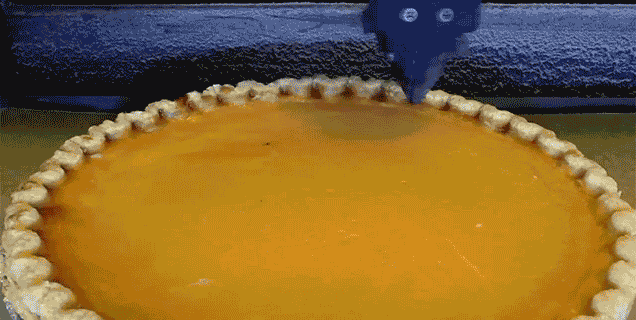Is only going up in the elevator getting you down? Not for much longer: ThyssenKrupp, the German steel and engineering company, …
Monthly Archives: November 2014
Syrian Electronic Army attack spreads pop-ups across news sites
By Stephen Shankland “You’ve been hacked” messages appear at CNBC, the Boston Globe and UK newspapers. The attack comes through an Internet address hijacking involving startup Gigya.
The five worst Thanksgiving turkey cooking disasters
By Omar Kardoudi on Sploid, shared by Andrew Liszewski to Gizmodo
Fried turkey is delicious but if you don’t know how to cook it properly …
Source:: http://feeds.gawker.com/~r/gizmodo/full/~3/B6M35vG55L4/+andrewliszewski
Laser-Etch Your Pumpkin Pie To Create a True Thanksgiving Masterpiece
To guarantee a chorus of oohs and aahs when you bring your pumpkin pie to the table today, why not consider first …
Laser-Etch Your Pumpkin Pie To Create a True Thanksgiving Masterpiece
To guarantee a chorus of oohs and aahs when you bring your pumpkin pie to the table today, why not consider first …
Laser-Etch Your Pumpkin Pie To Create a True Thanksgiving Masterpiece
To guarantee a chorus of oohs and aahs when you bring your pumpkin pie to the table today, why not consider first …
‘Star Trek’ began filming 50 years ago
By Rich Trenholm The crew of the Enterprise walked in front of cameras for the first time on 27 November 1964 — but the legendary TV show nearly didn’t make it to the screen.
…read more
‘Star Trek’ began filming 50 years ago
By Rich Trenholm The crew of the Enterprise walked in front of cameras for the first time on 27 November 1964 — but the legendary TV show nearly didn’t make it to the screen.
…read more
Opera Wants to Make All Apps Subscription Services
Qt Weekly #21: Dynamic OpenGL implementation loading in Qt 5.4
By Laszlo Agocs
In Qt 5.4 there is a new configure option on Windows: -opengl dynamic. This, in addition to -opengl desktop and -opengl es2, changes the OpenGL implementation (and implicitly the window system interface API) that Qt is built against. However, unlike the previously existing flags, dynamic is something different. Enabling it ensures that neither the Qt libraries nor the applications link directly to an OpenGL implementation, meaning that neither opengl32.lib nor libEGL.lib + libGLESv2.lib are not passed to the linker. Instead, Qt will, upon application startup, choose the implementation to load.
Starting with the Qt 5.4 release candidate the previously ANGLE-only pre-built packages are changed to be dynamic builds. It is therefore time to take a closer look at this feature.
Up until Qt 5.4 the binary packages of Qt have been offered in two variants: desktop OpenGL (meaning opengl32.dll) and ANGLE. ANGLE provides an EGL and OpenGL ES 2.0 (soon 3.0) implementation by translating calls and shaders to Direct3D9 or 11. This is very handy for systems that have a lacking OpenGL implementation, for example due to not having the necessary graphics drivers or installed or due to using remote desktop. In addition, Direct3D 11 supports WARP, a software rasterizer.
The ability to work on a wider range of systems made ANGLE a promising prospect for providing OpenGL support for Qt and Qt Quick 2 on Windows, and so it became the default configuration setting. This is true in 5.4 too: configure defaults to ANGLE when no -opengl setting is specified.
However, the results were not always pretty. Offering multiple versions of the binaries causes confusion when getting started (which package to download?) and when deploying (which Qt libraries to ship with my application?). Relying exclusively on ANGLE is not an option in practice. Many desktop applications want OpenGL 3.x and 4.x features. On systems where a proper graphics driver is known to be available, the translation to Direct3D is unnecessary. Advanced modes of operation, like rendering from multiple threads have issues with ANGLE. Therefore the “desktop” OpenGL packages, meaning binaries linked against opengl32, had to be made available.
To eliminate the confusion, Qt 5.4 introduces the concept of dynamic OpenGL implementation selection. The binaries built in this mode are capable of operating with opengl32 (using WGL as the windowing system interface and regular OpenGL), ANGLE (using EGL and Open GL ES) or with a custom opengl32 variant (for example Mesa llvmpipe). …read more








